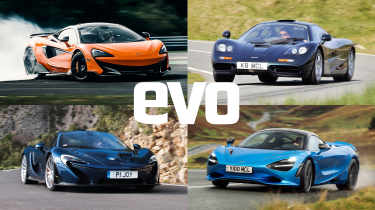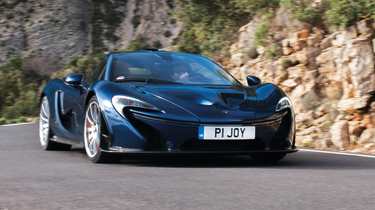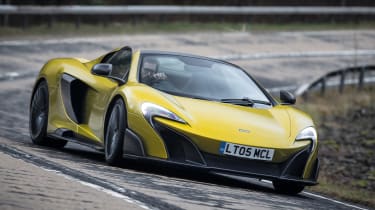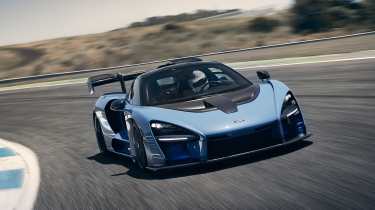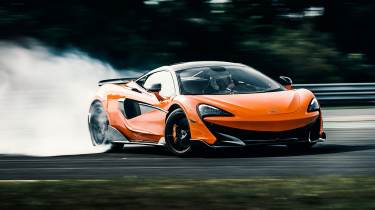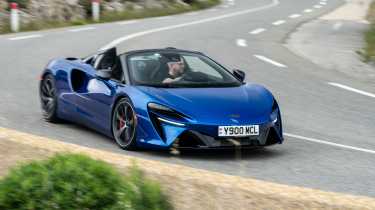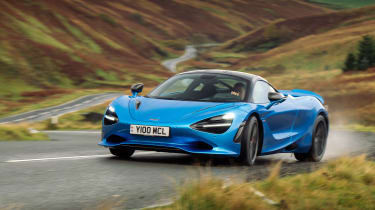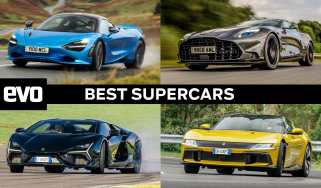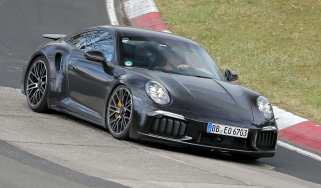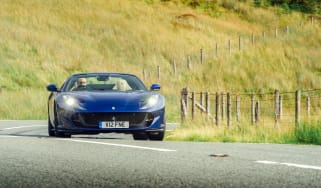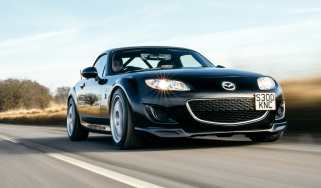Best Mclarens – the most scintillating Woking supercars
McLaren has produced some of the most stunning, technically impressive supercars in history – these are the best of the bunch
It's hard to believe that McLaren has been in the modern supercar game for just 13 years. In that time it's evolved from a maker of technically impressive but slightly cold driving machines to a bonafide Ferrari competitor – and evo Car of the Year winner.
Yes, there have perhaps been too many derivatives of the tried and tested McLaren formula (nearly all of its road cars have been mid-engined with twin-turbo V8s so far), but when the peaks are so high, we can't blame the firm for sticking to what it knows. In its short post-F1 history, McLaren has produced hall-of-famers like the P1, 675LT and 750S, and models like the new-age Artura, which proves the enduring appeal of McLaren supercars will continue into the hybrid era. The new W1 hypercar promises to join the ranks soon, too, following the footsteps of the mighty F1 and P1.
Here we list our favourite models from the brands fast evolving portfolio, from past and present.
Best McLaren road cars
McLaren F1
The F1 is, of course, where McLaren’s road car story begins. It’s father of the P1, grandfather to the new W1, and arguably still the benchmark for analogue hypercars to follow. According to its designer, Gordon Murray, nothing has meaningfully moved the game on from the F1 despite its age, prompting him to create his own successor, the T.50.
But back to 1992, in the F1’s centrally-mounted seat. You instantly feel plugged into a place where every synapse is overwhelmed and you feel giddy, excited, terrified, faint even. The legend of the F1 contributes to this feeling – I mean, this is a McLaren F1 for godsakes, and you’re driving it – but so does the tangible experience. Sat in the middle, your back is aligned with the crankshaft of that glorious 6.1-litre V12 and your ears inches from the overhead air intake. The noise, intensity and feedback are all consuming, and though the F1 isn’t perfect – its brakes aren’t quite up to the task and it can feel slightly lazy compared to modern supercars – it remains unforgettable, and one of the most exciting road cars we’ve ever driven.
McLaren P1
The P1 was a turning point for McLaren. Aside from its monumental, mouth-drying performance, it marked a turning point from the 12C’s somewhat clinical character, demonstrating that the revived McLaren Automotive could produce something truly wild and exciting. Even in the current age of 2000bhp EV hypercars, it still feels absurdly fast, with outrageous levels of grip, stability, control and precision.
It’s raw, too. Stones ping loudly into the underside of the carbon tub and tyres slap noisily into the road surface. The soundtrack from the 903bhp 3.8-litre V8 hybrid powertrain is uncultured, with the tuneless din of industrial turbocharging: whooshes under load and piercing whistles from the wastegate. The car feels rigid over bumpy roads, dropping heavily into potholes, suspension just about rounding off the edges enough to keep it the right side of useable. The P1 is extreme, and until the W1 launches, remains the ultimate expression of what modern McLaren can do.
McLaren 675LT
The 675LT distils some of the P1’s DNA into a more conventional supercar package, and the result is one of the most intensely involving cars of recent memory. In everything the LT does – the way it grips, steers and brakes, the way it accelerates and corners and the way it sounds – there is certified perfection.
It has the same flat-bodied, instantaneous chassis response as the P1 and the same way of digging both axles equally hard into the tarmac so that you feel suspended perfectly between them. Its non-hybrid V8 doesn’t get near P1 levels of outright thrust, but the 675 is still utterly ballistic, with 666bhp giving the rear tyres a hell of a lot to think about. Even in light of the further developed, more advanced 720S and 750S, it remains one of the most bewitching McLaren supercars of them all.
McLaren Senna
When a car is named after one of the most revered racing drivers in history, it better be good. Thankfully – and despite its slightly gawky appearance – the Senna is a truly formidable supercar, with a level of track performance that makes you wonder whether it was destined for the grid at the Spa 24 Hours.
Central to the Senna's ability is its aero package, with intricate air pathways, vents and downforce generators scattered all over the body. It's not the prettiest solution but it's damn effective, the Senna generating 800kg of downforce at 155mph. Combine this with a sub-1200kg dry weight and a 789bhp twin-turbo V8, and you have the makings of an almost otherworldly road car. Extracting the Senna's maximum requires serious concentration and bravery, but it's ultimately as precise and progressive as it is fast.
McLaren 600LT
When McLaren launched the 570S, we couldn't help but wonder how brilliant a hardened, GT3 RS-rivalling LT model would be. In 2018 we found out with the 600LT, which blew us away with its combination of speed, agility and tactility – so much so that it took victory at evo Car of the Year 2018.
There's more than a hint of 675LT-style aggression about the 600LT. Feedback streams through the car and while a 592bhp mid-engined turbocharged supercar sounds like it should be treated with caution, the LT is progressive enough to be exploitable on both road and track. It shoots flames out of its top exit exhausts, too, which is always a plus.
McLaren Artura
You might have wondered whether moving to hybrid power would erode the purity of McLaren supercars, but a run in an Artura would eradicate those concerns in about 5 minutes. The Artura is as absorbing as modern supercars come, and even more so in its latest, updated form. The hybrid V6 powertrain generates 690bhp, giving it a rapid 0-62mph time of 3sec and a turn of pace that used to be reserved for the very pinnacle of supercars.
On the chassis side, the Artura is clear, communicative and a joy to drive hard, coming alive and communicating it's limits clearly when you reach them. The latest Artura has further refinements in the form of calmer steering with less kickback and more consistent braking feels and performance. The updates make what was already a fabulous supercar – one that came joint third at eCoty 2022 – even better.
McLaren 750S
The 750S looks very much like the 720S, and the spec sheet isn't much different either. It still uses a 700bhp+ M840T 4-litre twin-turbo V8, a carbon MonoCell chassis and sophisticated hydraulically cross-linked suspension, but given that the 720 is one of the most intensely involving cars we've driven in the last decade, we don't mind that the 750 is more of the same.
In fact, the 750 is the same but better. Upgrades inspired by the 765LT make it even sharper and more exciting, with revised spring rates, new geometry and tweaked damper settings give it an extra level of bite without sacrificing the 720’s usability. The freefall-style acceleration of its predecessor is even more explosive, too, with the engine now generating 740bhp – and without the assistance of an electric motor. The result is an old school-feeling supercar that makes for a raw and refreshing alternative to hybrid rivals, one that narrowly missed out on evo's Car of the Year crown in 2023.

